
Understanding the Best Swimming Pool Heat Pump with a Water Chiller and How They Work
Key Takeaways
A swimming pool heat pump with a water chiller provides dual functionality, regulating water temperature for both heating during cooler months and cooling during warmer months.
These systems are energy-efficient and cost-effective, potentially saving pool owners about $400 annually, while also providing consistent temperature control.
Selecting the right unit depends on various factors such as pool size, climate, and additional features like automated controls and dual thermostats for optimal performance.
What is a Swimming Pool Heat Pump with a Water Chiller?
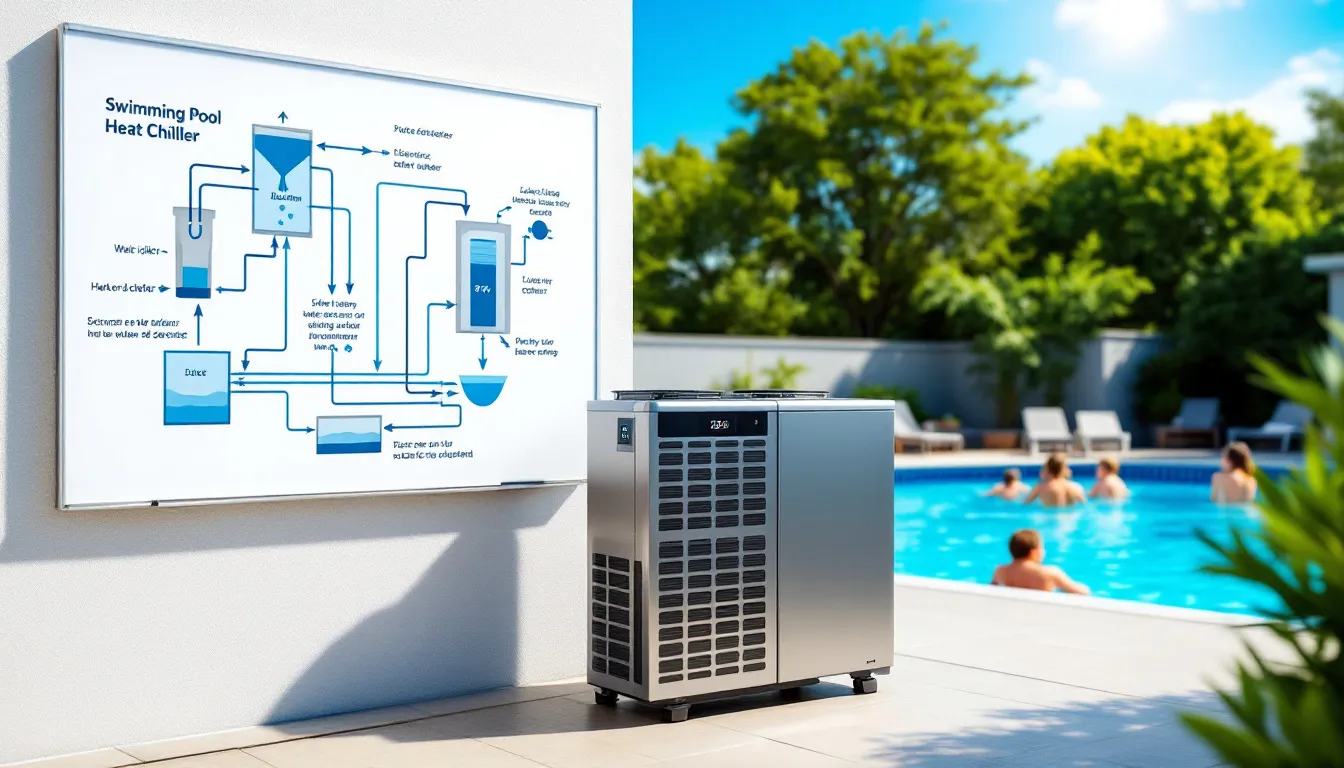
A swimming pool heat pump is a device that transfers heat from the outside air to the pool water, effectively heating your pool without relying on traditional methods like gas heaters. But what if you could have a unit that not only heats but also cools your pool water? That’s where a pool heat pump with a water chiller comes in.
These dual-purpose units are designed to regulate your pool’s circulating pool water temperature, ensuring a comfortable swimming environment year-round. During the hot summer months, they function as pool chillers, cooling the water to a refreshing temperature. Conversely, in cooler weather, they serve as efficient pool heaters, drawing heat from the outside air to warm the water.
A pool chiller is essential when water temperatures exceed 78 to 86 degrees, particularly in areas with varying temperatures or pools with dark bottoms that absorb more heat. They can keep your cooler pool water at the perfect temperature, making every swim an enjoyable experience in the pool’s water.
How Does a Swimming Pool Heat Pump with a Water Chiller Work?
The magic behind these units lies in their sophisticated working mechanism. A heat pump pool heater regulates pool temperature using outside air, an evaporator coil, a compressor, and a condenser. The process begins with the evaporator coil absorbing heat from the outside air, causing the refrigerant to transform from a liquid to a gas.
Next, the gas refrigerant is compressed, raising its temperature significantly. This high-temperature gas then passes through the condenser coil, where it transfers its heat to the pool water, effectively warming it. The cooled refrigerant returns to its liquid state and cycles back to the evaporator coil to repeat the process.
In cooling mode, the heat pump operates in reverse, automatically adjusting the pool’s temperature by circulating water. This dual functionality ensures your pool remains at the desired temperature, providing a comfortable swimming experience regardless of external weather conditions.
Benefits of Using a Swimming Pool Heat Pump with a Water Chiller
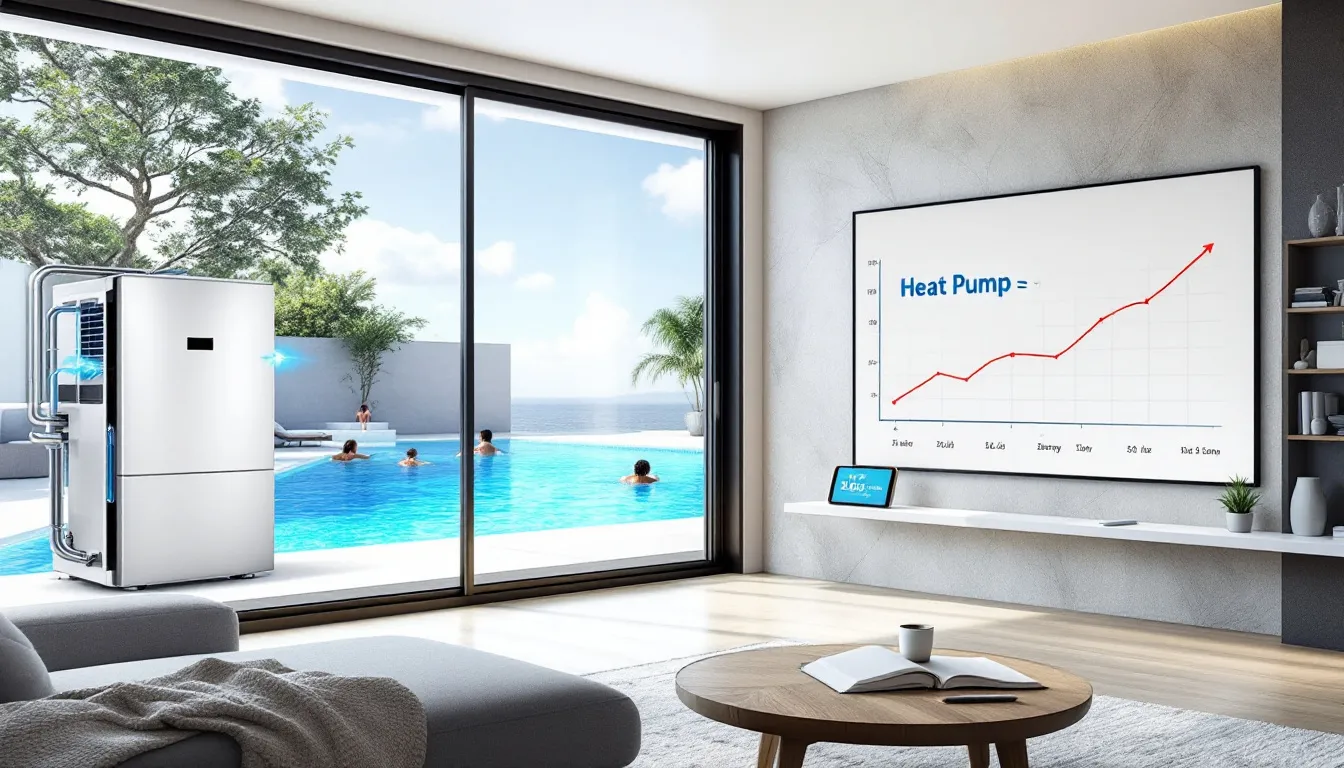
One of the standout benefits of heat pumps with chillers is their energy efficiency. These units can run at an operational cost as low as 75 cents per hour, making them an economical choice for pool owners. With proper maintenance, these systems can last over 20 years, reducing long-term expenses and ensuring a consistent, comfortable pool temperature.
The cooling capability of these units is often a primary reason for choosing them over traditional heating solutions. During the hot summer months, they can keep your pool water refreshingly cool, extending the swimming season and promoting comfortable swimming conditions. This feature becomes particularly valuable in regions with high summer temperatures, especially when considering options for heating pools.
Another significant advantage is the consistent water temperature maintained by these units. Whether it’s a hot day or a cold night, a heat pump with a chiller ensures your pool water remains at an ideal temperature. Some models even facilitate cold plunge pools, providing a therapeutic benefit for users.
Investing in a heat pump with a chiller is also more cost-effective than buying a separate chiller later. This dual functionality reduces the need for additional equipment, leading to lower long-term costs and a more streamlined system for your pool.
Types of Swimming Pool Heat Pumps with Water Chillers
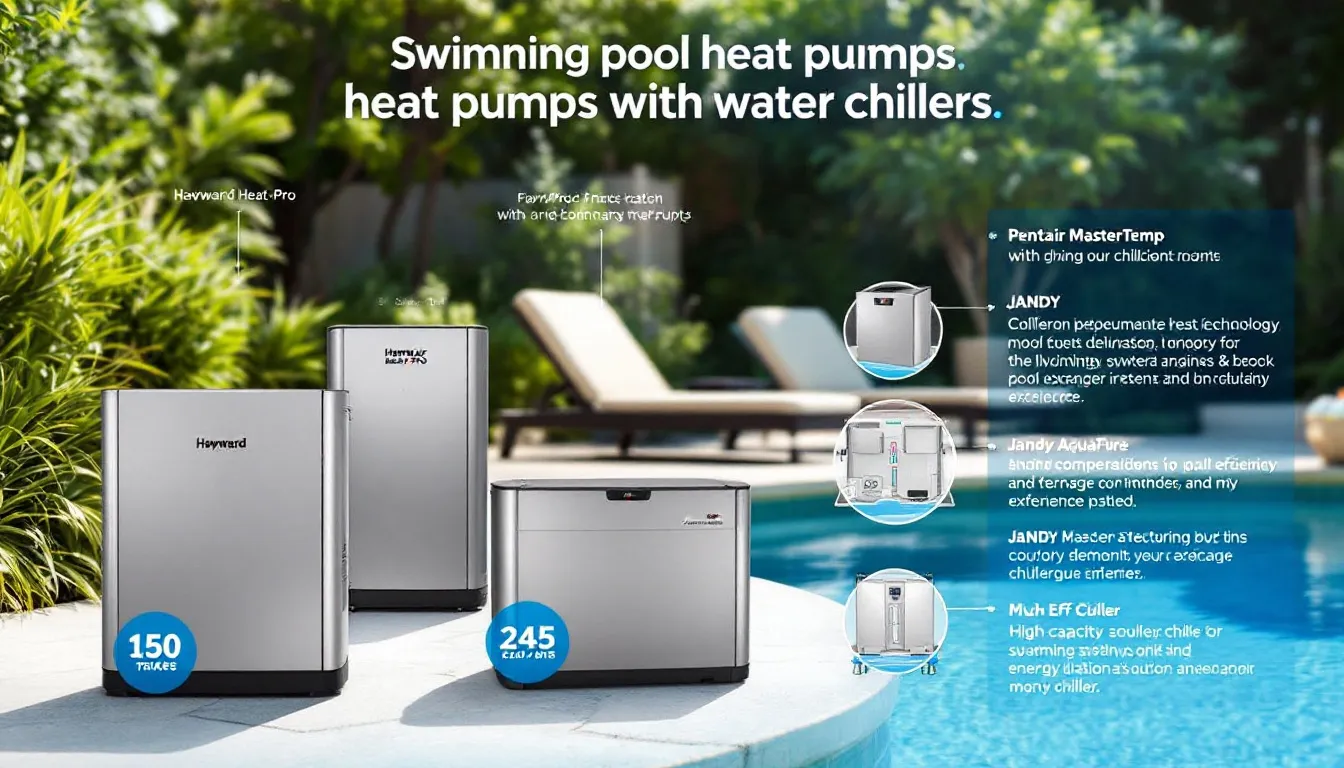
When it comes to swimming pool heat pumps with water chillers, there are several types to choose from. These include single-phase and three-phase units, each suitable for different pool sizes and climates. Single-phase units are typically used for residential pools, while three-phase units are designed for larger commercial setups.
The standard size ratings for heat pump pool heaters are 3.5 hp/75,000 Btu, 5 hp/100,000 Btu, and 6 hp/125,000 Btu. These ratings help determine the unit’s capacity and suitability for your pool. It’s essential to choose the right size to ensure efficient heating and cooling without overloading the system.
Considering the cooling output of these units compared to gas heaters is also important. While gas heaters may offer faster heating, heat pump chillers are more energy-efficient and cost-effective in the long run. The climate significantly influences the type of pool heater that should be selected, with gas heaters being more suitable for colder regions.
Installation Process for Swimming Pool Heat Pumps with Water Chillers
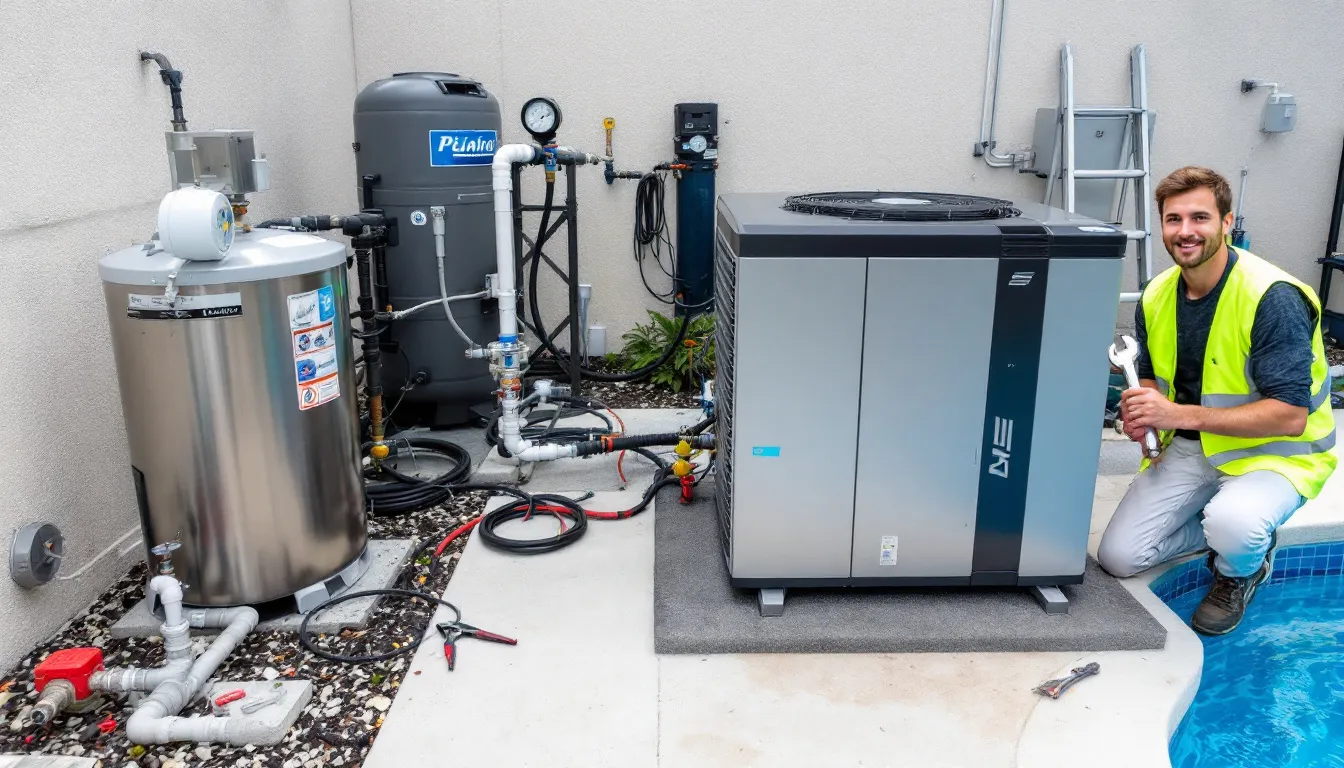
Assessing the site for space, ventilation, and accessibility is crucial before installing a swimming pool heat pump with a water chiller. Proper placement of the chiller away from direct sunlight and debris ensures better performance and longevity of the unit.
The next step involves plumbing connections to integrate the chiller with the pool’s return line, ensuring effective water cycling. Electrical work during installation should only be handled by qualified electricians due to safety risks. This step is vital to ensure the unit operates safely and efficiently.
Post-installation, the system must be tested and calibrated to ensure it operates at the desired temperature, verifying proper functioning and performance.
Maintenance Tips for Optimal Performance
Regular maintenance of your swimming pool heat pump with a water chiller ensures optimal performance and longevity. Regularly cleaning the heat exchanger prevents overheating and ensures proper airflow. Similarly, cleaning the external coils of the heat pump helps prevent dirt buildup, which can decrease efficiency.
Regular filter checks and cleanings can prevent many operational issues. Inspecting and replacing damaged refrigerant line insulation is also crucial for maintaining optimal performance. Additionally, checking for internal leaks in the heater can help prevent corrosion and long-term damage.
Keep the area around the heater clear of plants to ensure proper airflow and reduce moisture. Inspect and clean the burner flames to ensure they burn correctly, maintaining efficiency and prolonging the life of your unit.
Energy Efficiency and Cost Savings
Heat pumps are more energy-efficient than traditional gas heaters because they primarily rely on electricity to function. They offer better energy savings compared to gas heaters, using less electricity to maintain the desired pool temperature. This efficiency translates to significant cost savings over time.
A higher Coefficient of Performance (COP) indicates more efficiency in energy use for heat pumps. While the initial purchase cost of heat pump pool heaters may be higher, they result in lower annual operating costs due to their greater efficiency. This aspect makes them a wise investment in the long run.
Consider long-term operational costs alongside the initial purchase price when selecting a pool heater. Investing in energy-efficient models can significantly reduce monthly electricity expenses, leading to long-term financial benefits. The energy savings provided by a heat pump can estimate around $400 a year.
Energy efficiency ratings are crucial for understanding the potential savings and environmental impact of different heating options. By choosing a high-efficiency unit, you not only save money but also contribute to a more sustainable environment.
Choosing the Right Unit for Your Pool
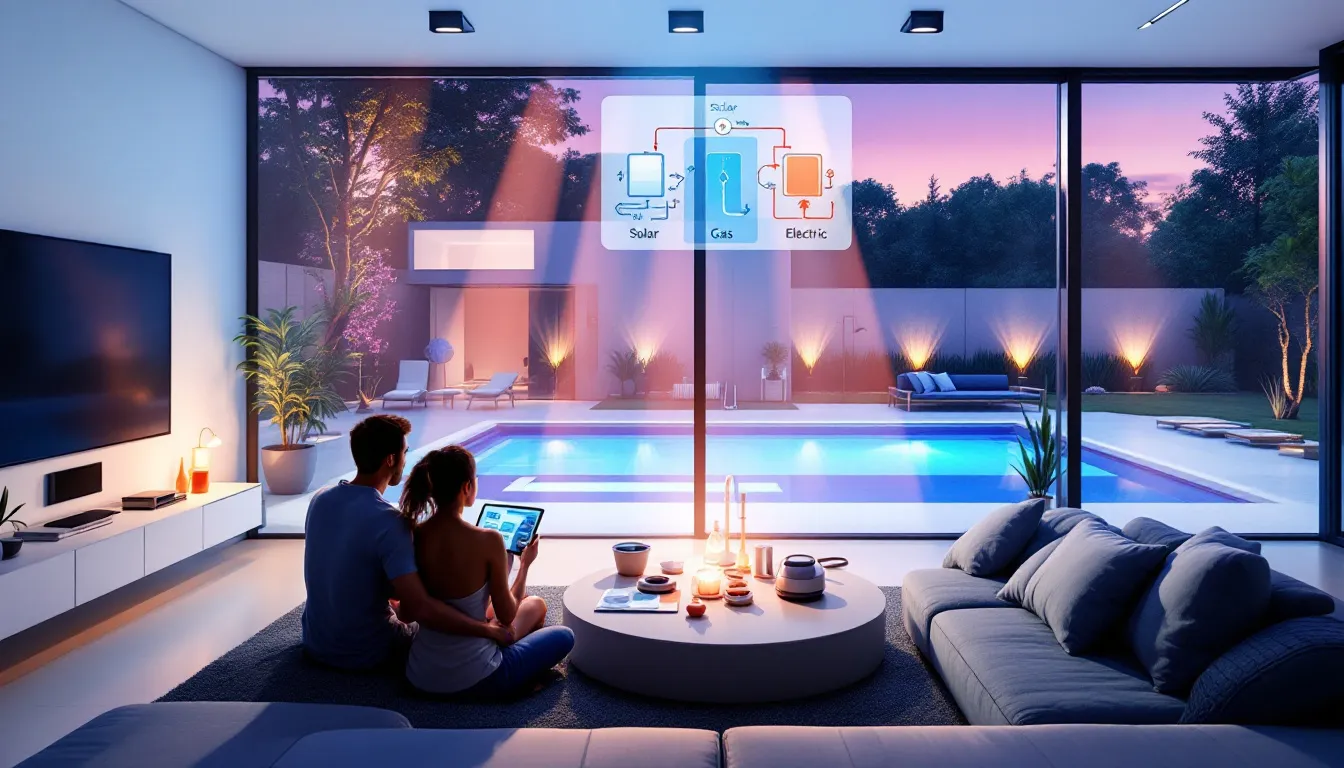
Choosing the right swimming pool heat pump with a water chiller involves several considerations. These units can maintain the desired temperature in various pool sizes, from small residential pools to large commercial setups. It’s advisable to have a trained pool professional perform a sizing analysis to determine the best unit for your needs.
Consider factors like the pool’s surface area, temperature difference, wind exposure, humidity levels, and cool night temperatures. These climate factors significantly affect the heating load for outdoor pools. Automated timer controls can enhance the functionality of heater/chiller units, allowing for precise temperature management.
Additionally, dual thermostats allow for separate temperature settings in the pool and spa, providing greater flexibility and comfort. Selecting the right pool heater ensures comfort and efficiency, making an informed decision crucial for optimal performance with innovative thermo control technology.
Common Issues and Troubleshooting
Like any complex system, swimming pool heat pumps with water chillers can encounter issues. Low water flow, often fixed by ensuring the pool pump is operational and unobstructed, is a common problem. Error codes on pool heaters indicate specific issues; for instance, a FLO error points to insufficient water flow.
The CEr error suggests a potential issue with the communication cable, requiring inspection by a technician. A malfunctioning defrost sensor triggering the dPC or dPO error indicates it needs replacement. If the refrigerant system’s high-pressure switch activates, it may signal obstructions in water flow that need to be resolved.
Low refrigerant pressure, typically indicating a leak, requires professional attention. Repeated high-pressure faults, indicated by the HPS error code, should be addressed by resetting the system and resolving underlying flow issues. The high water temperature error may occur due to a malfunctioning control system or other heat sources impacting the heater.
Summary
In summary, swimming pool heat pumps with water chillers offer a versatile and efficient solution for maintaining the ideal pool temperature year-round. Their dual functionality of heating and cooling provides comfort regardless of the season, and their energy efficiency translates to significant cost savings over time.
Investing in one of these units is not just about immediate convenience but also about long-term financial and environmental benefits. By choosing the right unit and maintaining it properly, you can extend your swimming season and enjoy a consistently comfortable pool experience.
Frequently Asked Questions
What is a swimming pool heat pump with a water chiller?
A swimming pool heat pump with a water chiller is a versatile system that both heats and cools pool water, providing a comfortable swimming experience year-round. This dual-functionality makes it an excellent choice for maintaining optimal water temperatures in any climate.
How does a swimming pool heat pump with a water chiller work?
A swimming pool heat pump with a water chiller effectively regulates pool temperature by utilizing outside air, an evaporator coil, a compressor, and a condenser to either heat or cool the water as necessary. This system ensures optimal water temperature for comfort and enjoyment throughout the swimming season.
What are the benefits of using a swimming pool heat pump with a water chiller?
The use of a swimming pool heat pump with a water chiller offers significant benefits such as energy efficiency, cost savings, an extended swimming season, and consistent water temperature. Additionally, it provides therapeutic options, enhancing your overall swimming experience.
How do I choose the right unit for my pool?
To choose the right unit for your pool, assess factors such as pool size, climate, surface area, temperature difference, wind exposure, and humidity levels. It is advisable to seek a professional sizing analysis for the most accurate selection.
What are common issues with swimming pool heat pumps with water chillers and how can I troubleshoot them?
Common issues with swimming pool heat pumps include low water flow, error codes, refrigerant system problems, and high-pressure faults. Regular maintenance and consulting a professional for serious issues are essential for effective troubleshooting.


